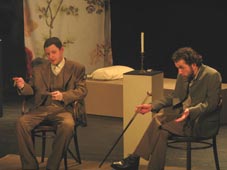Georgian interpretation of Schmitt’s triumphal play
By Salome Modebadze
Friday, April 8

The amazing drama translated by Ketevan Kvantaliani had been wonderfully staged by Gosha Gorgoshidze at the theatre’s experimental stage. The old Jewish professor living in Vienna is constantly oppressed by Nazi officers. The only way out of this awful situation is to sign the agreement on departure from his much beloved capital but Freud is hesitant about making such a difficult decision. But unfortunately his brave daughter Anna is taken to the Gestapo, the official secret police of Nazi Germany.
The old professor remains alone in despair when suddenly a stranger visits him to remind him of his forgotten past and help define the future… The Atheist professor can hardly believe that his visitor is God but their dialogue becomes more and more interesting. Goga Barbakadze (the visitor) and Bacho Chachibaia (Freud) dealt wonderfully with their roles. It was strange for Bacho to play an old professor but “when I first read the scenario, I grew up several years and started looking at things in different ways,” Chachibaia told The Messenger.
The constant struggle between the human mind and faith had been interestingly discussed at The Visitor. Talking of the main idea of the play Goga Barbakadze told me that “even Freud had found God at his elder age”. It was a great opportunity for me to refresh my values and I would also recommend you to see and enjoy the world famous play.
